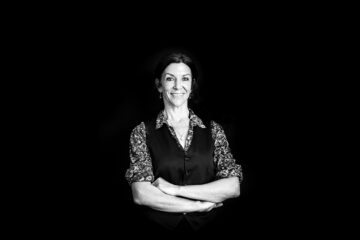Editor’s Note: I am the host, producer and photographer for the We Are Chaffee: Looking Upstream podcast. I also write a monthly guest column related to the podcast for two local newspapers in Chaffee County, Colo.: the Chaffee County Times (Buena Vista) and The Mountain Mail (Salida). This is my column based on my conversation with happiness expert and international keynote speaker Rob Dubin.
In a recent episode of the We Are Chaffee: Looking Upstream podcast, I talked with Rob Dubin, an international keynote speaker and former filmmaker who has become an expert on happiness and resilience.
Dubin and his wife, Dee, made national news 30 years ago when they survived several days in the backcountry during a phenomenal blizzard near Aspen, Colo. It was one of those harrowing experiences where you get a phone call from the President of the United States afterward, and national television shows clamor for your story.
I talked with Dubin about that survival experience and, like Katie Couric, was curious to know not only how but why survival against all odds was possible. The sheriff of Pitkin County at the time presumed them dead and frozen, the odds of survival too shrunken to risk search-and-rescuers’ well-being any longer. He said a search for their bodies would resume in the spring, but the Dubins wouldn’t have it.
A few years after that experience, Dubin retired from filmmaking at 42. He and his wife sold their home and bought a 40’ sailboat. They sailed the world for what would become a 17-year-long adventure. They studied human happiness and fulfillment, collecting insights from billionaire yachtsmen to the humblest of us living in developing nations.
In our Looking Upstream conversation, Dubin shared what he thought about while at sea during those years and what he figured out about life, its meaning and purpose. We also talked about the keys to relationships and how he and Dee navigated life aboard a sailboat with only 300-some-odd square feet of space.
“A lot of people, when they’re different, they make the other person wrong. One of the things we learned from our sailing, right off of the bat, was to be less judgmental, because we all have different rules for life,” Dubin said.
“What you think is okay isn’t the same as what I think is okay or acceptable or proper. And it can be anything from how we run our lives to how to load the dishwasher. And if you make the other person wrong for not doing it your way, you are just setting yourself up for unhappiness.”
I don’t know what life on a sailboat with a mate is like. But like many of you, I’m all too well acquainted with the dishwasher discussion.
There are many noteworthy takeaways from my conversation with him. It’s the kind of podcast episode you might want to listen to a few times, or at least have a notepad and pen handy to capture those aha! moments from the happiness expert.
I will highlight two things now: (1) Happiness is a practice. It can be learned and cultivated. And (2) we’re not talking about fluffy toxic positivity, as if life is a fairytale and the pains and problems aren’t real.

Rob Dubin, photographed by Adam Williams | Humanitou
Dubin knows:
“Life beats us all down in some way. We’ve all had failures in our past, whether it’s a teenage broken heart or losing a family member, or getting fired from some job. We’ve all had a number of disappointments. You just don’t get to be an adult without having disappointments in your life. You really don’t get through fifth grade without having disappointments in your life.
“We often hear that it’s whether you see the glass is half full or half empty, and I don’t believe that’s what it is. When the sheriff said we had a 10 percent chance of survival, I assume he was basing that on however many people had been lost in the past in search and rescue situations. The conditions were as bad as I’ve ever seen in my life, and I’ve spent my life in the outdoors. So maybe he was right, we had a 10 percent chance of survival.
“But optimism is looking at that glass as it is. Maybe that glass was only 10 percent full, and recognizing that it’s 10 percent full, and then recognizing what that 90 percent empty part means. It means we don’t have enough sleeping bags. We didn’t have a tent. We don’t have any dry clothes. We don’t have enough food for all of us. Those things are real, but now focus on the 10 percent.”
Listen to my full conversation with Rob Dubin to learn more about his story, and his insights on happiness at wearechaffee.org, or on any podcast player … (or using the embedded player above).
Adam Williams hosts the We Are Chaffee: Looking Upstream podcast every other Tuesday. Follow @wearechaffeepod on Instagram.


